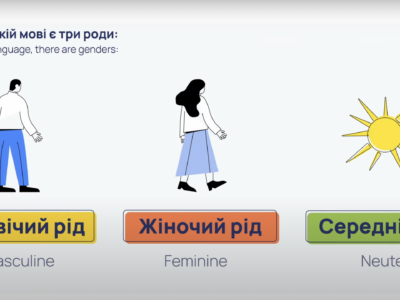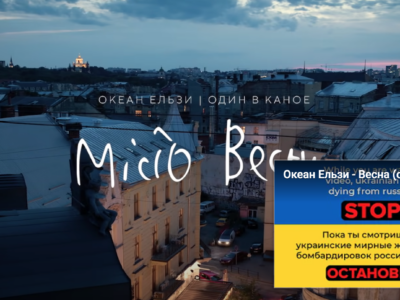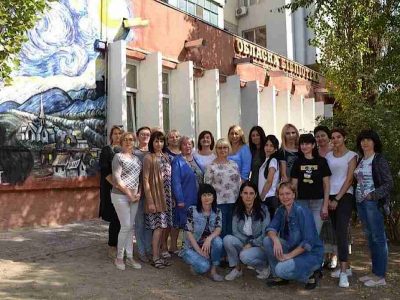
Screenshot from Volodymyr Tyravsky's YouTube video.
Ukrainian is a Slavic language written in the Cyrillic script and spoken by around 40 million people. Ukrainian speakers live mostly in Ukraine, but given the large and historical migration dating back to the 19th century, Soviet deportations, and the massive displacement of people following Russia’s invasion of Ukraine. Ukrainian can be heard and seen in Central and Eastern Europe, North and South America, Australia, Russia, and many other places.
There are between 12 to 15 different Slavic languages traditionally grouped into three linguistic branches: the southern, the western, and the eastern, which is what Ukrainian falls into, along with Belarussian and Russian. Those three predominantly use the Cyrillic alphabet and allow for some degree of mutual understanding, yet function as three separate languages. However, Moscow’s colonial view has often been that Belarussian and Ukrainian are “dialects” of Russian, and it has at times banned the use of Ukrainian in Ukrainian territories. The irony is that Kievan Rus, the civilization that combined Byzantine and early Slavic elements from the 9th to the 13th centuries, had its origins in today’s Kyiv, and then spread to what is today the European part of Russia.
For a more detailed history of Ukrainian, here is a YouTube video in English by Volodymyr Tyravsky, Global Voices Ukrainian translation manager.
During the Soviet period, the Soviet Socialist Republic of Ukraine established Ukrainian as one of its official languages and allowed for some media content, school education, and literature in Ukrainian, yet Russian was overall privileged as the gateway language to better job prospects and social status, as was the case in all non-Russian Soviet Republics.
As the Soviet Union neared its dissolution, Ukrainian was declared the official language of the Ukrainian SSR in 1989. Shortly after that, in 1991, Ukraine gained independence. In Ukraine, November 9 is the Day of Ukrainian Writing and Language since its proclamation in 1997, in reference to Nestor the Chronicler.
The modern Ukrainian language appears in print in the late 18th century, and has since produced rich literature that is finally getting the attention it deserves outside of Ukraine, thanks to a renewed interest from global publishers. The Ukrainian language has also gained wider visibility through music, including via global events such as the Eurovision, where Ukraine won twice.
Here is a selection of Global Voices’ reporting on the Ukrainian language and its presence in literature, music, and humor. Global Voices also translates its stories into Ukrainian.
Stories about Ukrainian language, arts, and culture
While in exile in Lviv, Ukraine, a Crimean Tatar woman promotes her community through cuisine
"It is about the nostalgia of those people who lived in Crimea, visited Crimea, or only dreamed of visiting it."
What a country at war can look like: A journey across Ukraine in photos
Life is flourishing in Ukraine but subtle signs and reminders of the full-scale war can be seen and felt even in the places most distant from the actual frontline.
The future of Ukrainian New York
A frontline town in eastern Ukraine restored its historic name and gained fame in 2021. Now, activists and supporters are trying to preserve what they can after losing their home and friends.
Death and defiance in a historic Ukrainian city after a Russian rocket strike
Ten people were killed and 42 wounded in Lviv, a city packed with tourists, civilian volunteers, and those fleeing the Russian occupation of the Ukrainian east and south.
Little Mariupol in exile in Dnipro, Ukraine
The hope of those from occupied Ukrainian lands lies in the people who are ready to rebuild everything — even if it means starting a humanitarian center in another city.
How I ended up despising my mother tongue in Ukraine
Attempts to explain our position to war supporters in Russia failed in the first months of 2022, and using Russian now evokes the trauma of that total non-understanding and aggressive denial.
Who will this generation be after the war in Ukraine?
I never cared about politics. And now I am 37, I have a bunch of written books under my belt, also translations, depression, and a gun.
Rewritten, recorded, reframed: Ukrainian wartime songs
Home, mothers, and soil are frequent symbols in Ukrainian wartime songs. These themes have deep roots in Ukrainian folklore — which is frequently referenced in Ukrainian contemporary music.
For Ukrainians defending their country, words are important
Russia is trying to destroy Ukraine not only by weapons, forced deportations, and “re-education” of children in the occupied territories, but also by words.
Ukrainian linguistic battlefields
A recent Facebook dispute about gendered names of professions in the Ukrainian language is about far more than gender.
In Ukraine, the war has reshaped language to create new idioms
Ukrainians' rage toward Russian forces occupying their land is playing out in a multitude of ways, including citizens' linguistic choices
Twitter Space: The Ukrainian language and its global significance
Read excerpts from our Twitter space on the Ukrainian language, the best tools for learning Ukrainian, parallels between Ukrainian refugees and other displaced peoples, and more. Find the full audio here.
My journey to learning Ukrainian and the online language tools that took me there
"For me, languages are an important way of making sense of the world and creating connections."
Gender equality in Ukrainian language: Feminine forms of professions now given full recognition
Ukrainian feminitives appeared in dictionaries about two centuries ago, acknowledging the growing social equality of women. Today they have been sanctioned by Ukrainian authorities and are widely used.
‘The world’s perception of Ukraine has changed’ says singer from cult band Okean Elzy
Singer Svyatoslav Vakarchuk from the Ukrainian cult band Okean Elzy spoke to Global Voices about Russian celebrities, his urge to perform during the crisis and why writing music is impossible.
Music in times of war: Song as a form of Ukrainian resistance
In Russia's invasion of Ukraine, culture and identity are at the center of the conflict. In this context, Ukrainian band "Okean Elzy" has stepped up to inspire the Ukrainian resistance.
Ukrainian library reinvents itself for a New Age
A youth library in Kherson shows the way to thriving in uncertain times as an educational and literary hub for the local community and wider region.
Meet ‘VKgoeswild,’ Ukraine's Classical Pianist-Turned Rocker
Despite winning numerous awards at international classical piano competitions and training with some of the biggest names in classical music, Viktoriya Yermolyeva decided to tackle another kind of music: rock.
Ukraine's Eurovision 2016 Entry Is About Stalin’s Repressions. Russia Isn't Thrilled.
Ukraine’s entry for the Eurovision 2016 music contest is a song about the deportation of the Crimean Tatars by the Stalin regime. So why are Russian officials upset?





















